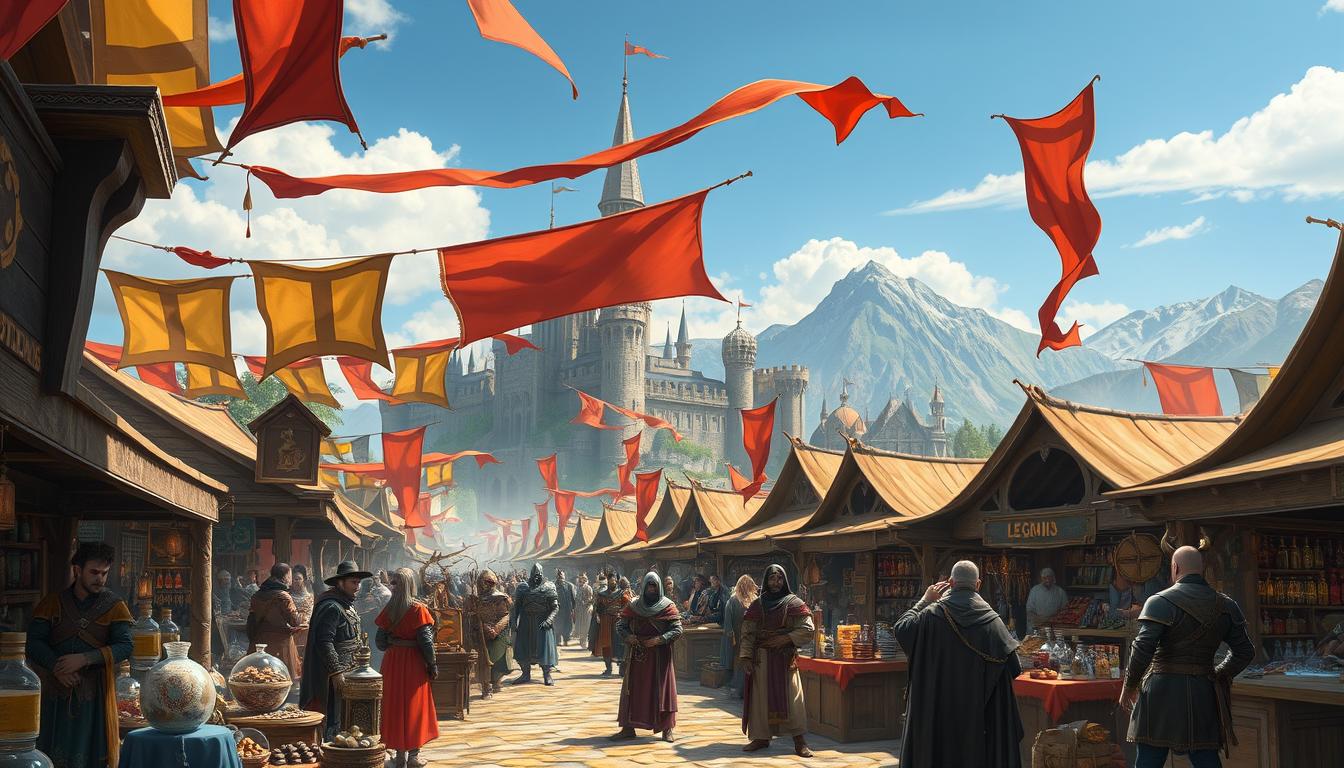Running a Business in DND 5e: Entrepreneurial Adventure
Ever thought about starting a fantasy business, like a tavern or trading post, in Dungeons & Dragons? Running a business in DND 5e lets players explore their entrepreneurial side. This journey includes managing resources, dealing with commerce, and magic, and becoming a successful business owner.

Key Takeaways
- Discover the importance of entrepreneurship in tabletop RPGs and how it can enhance your DND 5e experience.
- Understand the comprehensive business rules and mechanics in Dungeons & Dragons 5th Edition.
- Learn how to manage resources, navigate the world of commerce, and thrive as a business owner in your fantasy adventures.
- Explore the diverse range of business opportunities available in DND 5e, from farms to fighting schools and beyond.
- Uncover the roleplaying potential of running a business and how it can shape your character’s backstory and motivations.
Introduction to Running a Business in DND
Entrepreneurship and commerce are key in Dungeons & Dragons. They let players earn more, build big businesses, and influence the local economy. By starting businesses, players can craft unique stories, understand their characters better, and interact with NPCs in new ways.
The business rules in DND 5e give players a solid base to start, manage, and grow their fantasy businesses.
Importance of Entrepreneurship in Tabletop RPGs
In Dungeons & Dragons, entrepreneurship brings in-game commerce and economics to life. Players can run a tavern or a mercantile guild. This adds depth to their characters’ stories.
By tackling entrepreneurship in tabletop rpgs, players learn new skills, make strategic alliances, and influence the game world’s politics and economy.
Overview of Business Rules in Dungeons and Dragons 5th Edition
Dungeons & Dragons 5th Edition has detailed business rules. They are based on a single skill check, the “profit check.” This check, made with Profession or Craft skills, decides a business’s success or failure. Various factors influence the outcome.
The rules cover starting a business, needed resources, and managing it. This includes dealing with competition, disasters, and growth chances.
| Key Aspects of DND 5e Business Rules | Description |
|---|---|
| dnd 5e economics | The comprehensive set of rules governing the financial and economic aspects of running a business in the game. |
| mercantile gameplay | The incorporation of business-related activities and decision-making into the overall gameplay experience. |
| in-game commerce mechanics | The specific mechanics and systems that enable players to engage in commercial transactions and manage their enterprises. |
| dungeons and dragons business rules | The official guidelines and procedures outlined in the DND 5e rulebooks for establishing and operating businesses within the game world. |

Types of Businesses in DND 5e
Dungeons & Dragons 5th Edition has many business options for players. These range from criminal organizations and underground economies to legitimate businesses like shops and taverns. Each business offers its own challenges and rewards, making for exciting mercantile gameplay and in-game commerce mechanics.
Criminal Organizations and Underground Economies
The criminal organizations and underground economies in DND 5e operate outside the law. They include things like protection rackets and smuggling. Players need skills like Intimidate and Knowledge (local) to manage these businesses.
While these businesses may be morally complex, they offer unique roleplaying chances. They also provide the chance for high-risk, high-reward dnd 5e economics.
Legitimate Businesses: Shops, Taverns, and Services
DND 5e also has legitimate business options, like shops and taverns. These businesses need skills like Profession (shopkeeper) and Craft. Running these legitimate businesses in dnd 5e can give players steady income.
They also offer chances to connect with the local community. This allows for more traditional mercantile gameplay in the game world.
| Business Type | Relevant Skills | Profitability Factors |
|---|---|---|
| Criminal Organizations | Intimidate, Knowledge (local) | Illicit activities, high risk-high reward |
| Legitimate Businesses | Profession (shopkeeper), Profession (innkeeper), Craft, Profession | Steady income, community engagement, traditional commerce |

Building Your Business: Initial Investments and Resources
Starting a business in Dungeons & Dragons 5th Edition (DND 5e) is exciting and rewarding. You can start a mercantile gameplay in a shop, tavern, or service. Or, you can explore the in-game commerce mechanics of a criminal organization. The first steps and resources needed are key.
To start your starting a business in dnd 5e, decide what business you want and where it will be. DND 5e gives a guide for the minimum resources and costs. For example, opening a tavern in a big city might cost $32,000 at first. You’ll also need $8,000 for each upgrade.
Upgrading your business can give you a bonus on future profits. You’ll get a 1d4 result as an improvement. But, it might take about 5 years, or 64 months in a big city, to get your money back.
| Business Type | Initial Cost | Upgrade Cost | Profit Timeline |
|---|---|---|---|
| Tavern (Metropolis) | $32,000 | $8,000 per upgrade | 64 months (5+ years) |
| Shop (6th level) | $11,825 | N/A | Varies |
Staffing your business is also important. A good business might have 9 people working. This includes 2 people per shift, 3 shifts a day, and extra roles for hiring, training, accounting, and checking profits.
By knowing the dnd 5e economics and what resources you need, you can make smart choices. This will help you succeed in your business in Dungeons & Dragons.

Managing Your Business: Profit Checks and Modifiers
Running a business in Dungeons & Dragons 5th Edition is complex. It involves understanding the game’s commerce mechanics. The “profit check” is key, determining if a business succeeds or fails. It’s influenced by skills, location, and other factors.
Factors Affecting Profitability
Profitability in DND 5e businesses is not simple. Many things can affect a business’s success. For example, starting a business can cost anywhere from 120 GP to 240,000 GP. Upgrading a business also has a big price, from 0 GP at level 1 to 172,000 GP at level 17.
The profit modifiers for each business level are also important. They show how much money a business can make each quarter. These start at 15 GP for a level 1 business and can go up to 1,500 GP for a level 20 business.
Risk vs Reward: High-Risk, High-Reward Ventures
Dungeons & Dragons 5th Edition offers many business options. Each has its own risk and reward. High-risk, high-reward ventures like criminal organizations can make a lot of money but might fail. On the other hand, low-risk businesses like farms are safer but might not make as much.
Players need to think carefully about which business to choose. Their choice can greatly affect their character and the campaign.
| Business Level | Purchase Cost | Upgrade Cost | Profit Modifier |
|---|---|---|---|
| 1 | 120 GP | 0 GP | 15 GP |
| 5 | 3,000 GP | 2,000 GP | 150 GP |
| 10 | 30,000 GP | 22,000 GP | 600 GP |
| 15 | 120,000 GP | 72,000 GP | 1,050 GP |
| 20 | 240,000 GP | 172,000 GP | 1,500 GP |
Running a Business in DND 5e
Running a business in Dungeons & Dragons 5th Edition is complex. It needs careful planning and quick thinking. Players must handle tasks like profit checks and hiring employees. They also need to deal with competition and disasters while keeping a good reputation.
Dnd 5e economics focuses on making profit while facing mercantile gameplay challenges. Players must use their resources wisely and adapt to the game’s changes. Good business management can bring steady income, influence, and new adventures.
Players can run a tavern, magical item shop, or general goods store. They must hire the right staff, manage inventory, and respond to surprises. Every choice affects the game’s economy and the player’s experience.
By tackling the challenges of business in Dungeons & Dragons 5th Edition, players gain a new aspect of the game. They can improve their roleplaying and learn about dnd 5e economics.
Roleplaying Opportunities in Business Ownership
Starting a business in Dungeons & Dragons 5th Edition brings exciting roleplaying chances. Players can create detailed backstories for their characters. This lets them explore why they became entrepreneurs in the game world.
Creating Backstories and Character Motivations
Creating a backstory for a business owner lets players dive into their motivations. Maybe they were born into a merchant family, sparking a lifelong love for trade. Or perhaps they started a business to overcome a tough past, seeking financial security and respect.
These stories shape how your character runs a business in DND 5e. They influence risk-taking, negotiation, and relationships with employees, customers, and rivals. By crafting these details, you can make your roleplaying experience richer and more complex.
Interacting with NPCs and Influencing Local Economy
As a business owner in DND 5e, you’ll meet many NPCs. You’ll deal with loyal employees, supportive customers, and even rivals and corrupt officials. These interactions can boost your reputation, create new chances, or bring unexpected challenges.
Your business’s success or failure can really affect the local economy. It can change what goods and services are available, and even jobs. This aspect of mercantile gameplay and interacting with npcs as a business owner in dnd 5e can be very rewarding.
By diving into the roleplaying of business ownership, players can make their DND 5e experience more engaging. They can craft complex stories that explore dnd 5e economics and influencing the local economy in dnd 5e.
Acquisitions Incorporated: A Business-Focused Campaign
The world of Dungeons & Dragons 5th Edition has grown with the Acquisitions Incorporated sourcebook. It’s perfect for players wanting to run a business in a fantasy world. This 224-page book, made with the creators of Acquisitions Incorporated, offers new characters, spells, and monsters. It brings the show’s humor and corporate satire to life.
Overview of Acquisitions Incorporated Sourcebook
The sourcebook lets players start and manage their own chapter of the mega-corporation. It includes a prebuilt adventure called “The Orrery of the Wanderer” in six parts. This adds a new layer of business gameplay to long-term campaigns.
Unique Mechanics and Playable Races
The book introduces unique mechanics and a new race, the Verdan. Players can choose roles like Secretarian or Occultant, each with special abilities and magical items. The Verdan, a mutated goblinoid race, have traits perfect for adventuring and business.
These elements mix well with D&D 5e rules. They let players dive into the corporate world and explore acquisitions incorporated dnd sourcebook, business-focused dnd campaigns, and dnd 5e economics.
| Feature | Description |
|---|---|
| Franchise Levels | Align with the tier of play, increasing when the average party level reaches 5, 11, and 17. Characters gain new benefits and see their base of operations expand with each franchise level. |
| Downtime Activities | Franchise-led downtime allows players to continue engaging in business endeavors while away adventuring, such as Research and Schmoozing. |
| NPC Involvement | The adventure in the Acquisitions Incorporated book integrates franchise rules, running downtime, and emphasizes the importance of NPCs, offering a more immersive gaming experience. |
The Acquisitions Incorporated sourcebook is essential for any D&D group. It offers a fresh take on mercantile gameplay and dnd 5e economics. With its unique acquisitions incorporated mechanics and diverse playable races in acquisitions incorporated, it promises a new and exciting D&D experience.
Challenges and Events in Managing a Business
Starting a business in Dungeons & Dragons 5th Edition is tough. You’ll face many challenges and events that can affect your success. These include dealing with tough competition, natural disasters, and threats.
Handling Competition, Disasters, and Threats
The business world in DND 5e is very competitive. To succeed, you need to think strategically and market smartly. You must find ways to outdo your rivals and keep your business strong.
Disasters, both natural and man-made, can harm your business. Storms, monsters, and bandits can cause damage and disrupt your operations. Being prepared and having good security can help you overcome these challenges.
Expanding Your Enterprise and Franchise Opportunities
As your business grows, you might want to expand or start franchises. This can bring new challenges, like managing more locations and employees. But it also offers chances for growth and influence in the game world.
| Key Challenges | Potential Solutions |
|---|---|
| Fierce Competition | Innovative marketing, strategic partnerships, unique offerings |
| Natural Disasters and Threats | Disaster preparedness, robust security, cultivating local alliances |
| Business Expansion and Franchising | Effective management of multiple branches, hiring reliable employees, maintaining quality control |
Managing a business in DND 5e needs smart planning, resourcefulness, and flexibility. By getting ready for challenges, you can build a strong business. It can face any storm and grow to great success.
Conclusion
Running a business in DND 5e is a unique and rewarding experience for players. It lets them become fantasy entrepreneurs. They manage resources, deal with commerce’s complexities, and shape the dnd 5e economics.
Players can run legitimate businesses or explore the dark side of mercantile gameplay. This opens up many opportunities for roleplaying, character growth, and making strategic decisions.
As players grow their businesses, they face challenges but can make a big impact. They become savvy, resourceful, and cunning businesspeople in the Dungeons & Dragons 5th Edition world. This lets them shape the game’s economy and dive into entrepreneurship in tabletop rpgs.
The joy of running a successful business in DND 5e comes from the sense of achievement and strategic thinking. It also offers unique storylines. Whether aiming to be the wealthiest merchant or to disrupt the system, the running a business in dnd 5e system is rich and engaging. It leaves a lasting mark on the game world and the characters’ legacies.